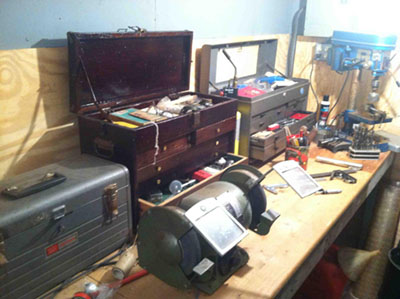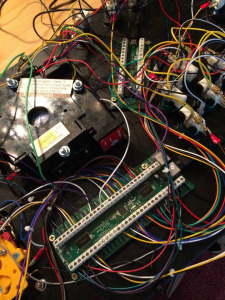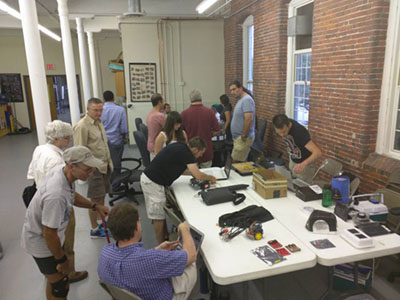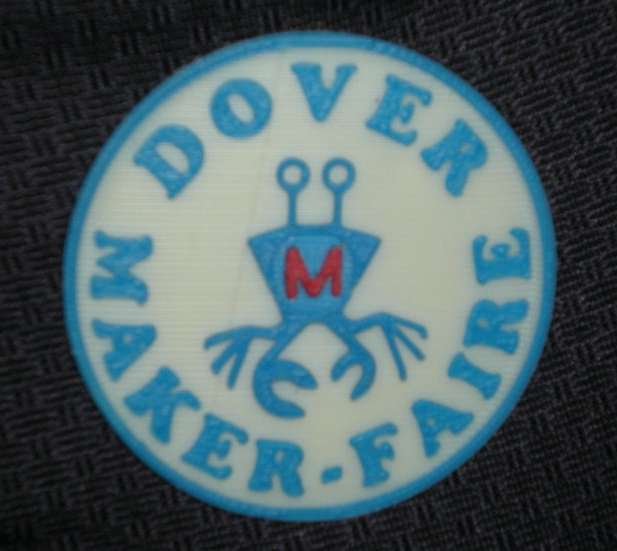There are a lot of misconceptions about what it means to be a “Maker” in a community of Makers, vs. being a member of a Makerspace. Manchester, NH is a city that is bursting with ingenuity, technology and entrepreneurs, and has attracted many Makers, all looking to accomplish the same thing: Offering support to people wanting to learn, invent and of course…make. I sat down to talk with two groups from Manchester who often get bundled into one in the public’s mind, The Makers of Manchester and Manchester Makerspace. I asked them to explain the differences between their groups and where they see themselves heading in the future.
Q. First off, what exactly is a “Maker?” Or, I guess a more interesting question might be, what isn’t a “Maker?”
Makers of Manchester:
“I think just about everyone is a Maker in some way,” shares Ryan Sutton. “Whether they make a robot, software, a book, a painting, a birthday cake, etc. I don’t think anyone really goes through life buying everything in the exact final form they want to use it. I feel a ‘Maker’ in the ‘Maker Community’ is someone who is looking to share and grow their experiences as a maker with others in the community.”
“And as for those people who ‘aren’t Makers,'” laughs Paul Beaudet, “Well, internally we call them ‘Muggles!'”
Manchester Makerspace:
“A Maker is a person who enjoys solving problems,” says Jesse O’Brien.
Q. There are two Manchester groups interested in supporting the whole Maker Movement, but you have focused on different ways of doing that. Can you describe the differences between Manchester Makerspace and Makers in Manchester?
Makers in Manchester:
“From my perspective,” answers Ryan Sutton, “the Makers in Manchester group is focused on building and fostering the community around Making. I really like our ‘Project Days’ that we have been having at SEE Science Center, which take on a ‘clubhouse’ feel, people coming in to work on their project or get help with areas they are challenged with. The space at SEE certainly isn’t a ‘full service’ makerspace but I was impressed what was able to be ‘packed in/packed out’ this past weekend and the progress people were able to make on their projects.”
Manchester Makerspace:
“In the simplest terms,” says Jesse O’Brien, “Manchester Makerspace encourages makers by providing workspace to makers who don’t have everything they need at home. All makers need a space to work, the primary distinction is whether they want to work in their own private space and outfit it with their own tools or in a shared space, where tools are outfitted and maintained by the community.
Q. How did each of your groups get started?
Makers in Manchester:
“Makers in Manchester has been around since Spring of 2013,” shares Brenda Noiseux “but the idea was seeded in the Summer of 2012. My friend John Shaver and I are costumers, prop makers and general tinkerers, and we weren’t finding enough time to work on our own projects. By creating a group, we thought being around other Makers would not only inspire us, but also that the monthly Show-and-Tell would help keep us accountable to working on our own projects. Along the way, we’ve expanded the organizational team to Paul, Ryan, and Rich Maynard and we also merged with another Maker meet-up group.
Manchester Makerspace:
“The Manchester Makerspace has gone through a few leadership groups so far,” says Jesse O’Brien “but this year has been the first time that an official non-profit organization was formed, and our small Board of Directors is now organizing plans to get founding members involved in decision making and build-out.
Q. I would consider myself a novice Maker. Which group would best suit my needs?
Makers in Manchester:
I’m sure both groups would be great for novices as everyone I have ever ever met in both groups are more than willing to help new people who are interested in something they can help with,” says Ryan Sutton. “The groups do provide different levels of services and costs which may sway someone one way or the other.”
“It really depends on the Maker’s interest,” says Paul Beaudet. “If they’re interested in machinery or car lifts, then the Makerspace is something to consider. If they’re interested in smaller hobby projects of the ‘carry in, carry out’ variety, then the project space at SEE may be something to consider.”
 Manchester Makerspace:
Manchester Makerspace:
“If you already have the tools you need to complete your project,” says Jesse O’Brien “Makers in Manchester is the perfect place to show your project off and get advice from other Makers. If your project is larger than you’re equipped to handle yourself, (perhaps it requires a milling machine, but you don’t want to buy a $10,000 machine for one project) the Manchester Makerspace would be able to save you a lot of stress and money.
Q. I like the sound of being a Maker, but I have ZERO experience! It feels intimidating to just show up to a meeting with no real project in mind. Can people come to your meetings to learn as well as make specific things?
Makers in Manchester:
“Absolutely!” says Ryan Sutton. “The monthly Thursday meetings are a great way to get ideas and learn what others are doing.”
“That’s actually a more common feeling then I might have thought,” says Paul Beaudet. “I would say, come in to a ‘Show and Tell,’ check it out and see where you may want to start, or if someone else inspires you. It’s a friendly and inclusive group. It is nice to know there is someone that is willing to help.”
Manchester Makerspace:
“Come to any meetup with Makers in Manchester, or go to any Makerspace (Portsmouth, Nashua, Manchester, Lowell, etc.) and start asking questions,” suggests Jesse O’Brien. “A big part of being a Maker is trying things until something works, and the process of becoming a Maker is your first chance to do that.”
Q. Are there fees involved in being a part of each group?
Makers in Manchester:
“There are currently no fees,” says Brenda Noiseux. “Our monthly ‘Show and Tell’ will always be free and open to the public, but we’re still working out the details on events like Project Days.
Manchester Makerspace:
Manchester Makerspace will charge a monthly fee (less than $100, but our payment structure is not defined yet), says Jesse O’Brien. “That money goes toward renting an industrial space ad keeping it stocked with tools, supplies and utilities.”
Q. WHY should people care about the Maker Movement and what has it brought to your lives?
Makers in Manchester
“For me,” says Ryan Sutton “the ‘Maker Movement’ has been great! I think I would have been doing the same things or at least the same type of things without it, but having like-minded people to get ideas from, bounce ideas off of, then show the results is a lot of fun. The level and varied knowledge in the group has certainly made my projects better since joining.”
“As Jesse mentioned,” says Brenda Noiseux “there’s a lot of problem solving and critical thinking that come with being a Maker. I think these two skills are critical to our everyday lives. The genuine excitement and energy of our Maker community invigorates me. It doesn’t matter if you’re an artist or an amateur robot builder, I learn so much from my fellow Makers and find different angles for my own projects. Now, if only I had the time to do them all!”
“This may sound left field,” says Paul Beaudet “but self sufficiency in an increasingly interdependent world is something that fascinates me. It’s been said that self sufficiency is more of a direction than a destination and that is an important note. Makers build all sorts of odd things, but the exercise of doing so stretches some important brain muscles. For instance, I build keyboards. But no one in the modern world will likely ever have to build their own, never mind build one to be ‘self-reliant.” It’s just my interest and it builds on my skills to do other things that could be better seen as self-reliant. Makers just have the drive to ‘do-it-themselves.’ The community aspect of the Makers Movement gives me the confidence that I’m surrounding myself with the people that could best survive a zombie apocalypse. So there you go. You should care about the Maker Movement if you want to survive the zombie apocalypse,” he laughs.
 Manchester Makerspace:
Manchester Makerspace:
“The key component to the Maker Movement,” says Jesse O’Brien “is to enable ‘normal’ people to innovate. Encouraging curiosity, creativity and new ideas isn’t new, but making it possible for everyone to participate is a relatively new concept. It’s important to show the world that people can do awesome things without a massive organization pushing them.”
You can learn more about Manchester Makerspace by visiting their website at http://manchestermakerspace.com
And you can join the Makers in Manchester at their monthly meetings, see them at the 2015 Dover Mini Maker Faire, or visit their website www.makersinmanchester.com to learn more.






